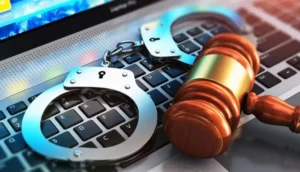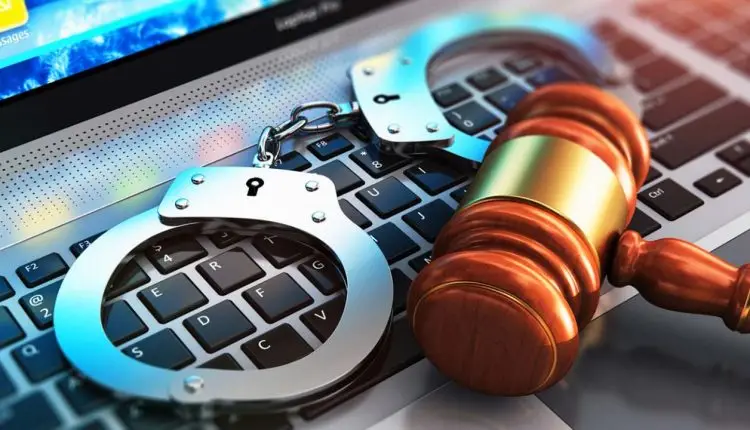Table of Contents
- 1 Cyber Crimes Act Enforced: Key Offenses, Sections & Penalties Explained (2025 Update)
- 2 Cyber Crimes Act – Section 1: Objectives of the Act
- 3 Cyber Crimes Act – Section 3: Unauthorized Access to Digital Devices
- 4 Section 4: Data Modification, Deletion, or Obstruction
- 5 Cyber Crimes Act – Section 5: Disclosure of Critical Information
- 6 Section 6: Possession of Critical Information
- 7 Cyber Crimes Act – Section 10: Recording of Private Conversations
- 8 Section 19: Publishing Misleading Information
- 9 Cyber Crimes Act – Section 21: Disclosing Police Summons or Call-Outs
- 10 Cyber Crimes Act – Section 22: Digital Harassment or Humiliation
- 11 Section 24: Inciting Ethnic Division (Classified as Domestic Terrorism)
- 12 Cyber Crimes Act – Section 31: Employees’ Responsibility
- 13 Section 32: Phishing, Spamming, and Computer Viruses
- 14 Cyber Crimes Act – Section 33: Electronic Cards Related Fraud
- 15 Responsibilities of Digital Platform Administrators
- 16 Frequently Asked Questions
- 17 Related Posts
Cyber Crimes Act Enforced: Key Offenses, Sections & Penalties Explained (2025 Update)
The Cyber Crimes Act is Nigeria’s primary legislation for regulating and punishing online criminal activities. Enacted to enhance cybersecurity, protect digital infrastructure, and ensure legal accountability in the digital space, this law covers various digital offenses ranging from data theft to electronic fraud.

Cyber Crimes Act – Section 1: Objectives of the Act
- Promote public confidence in the use of cyberspace.
- Protect national security and critical information infrastructure.
- Ensure accountability in digital communications and transactions.
This section lays the groundwork by setting the scope of the law: to criminalize internet-related offenses and provide a legal framework for prosecuting cybercriminals. It also aligns Nigeria’s digital policy with international cybersecurity standards.
This section addresses hacking or bypassing login credentials to access computer systems or networks. Whether for espionage, sabotage, or curiosity, such access without proper authorization is criminal.
It applies to unauthorized access to corporate databases, school records, personal cloud drives, banking systems, or government servers.
Penalty: Up to 3 years imprisonment or ₦7 million fine.
Section 4: Data Modification, Deletion, or Obstruction
Altering, deleting, or blocking access to any form of electronic data—emails, logs, documents, or databases—is an offense under this provision. It also covers insertion of false data or malware that modifies system behavior.
This protects the integrity of public records, digital evidence, and commercial databases.
Penalty: 3 years imprisonment and/or ₦7 million fine.
Cyber Crimes Act – Section 5: Disclosure of Critical Information
Section 5 makes it illegal to transmit, publish, or share any classified or confidential information obtained unlawfully. This includes national defense data, banking records, and intellectual property obtained through insider leaks or hacking.
It reinforces national security and business confidentiality.
Penalty: Up to 7 years in prison.
Section 6: Possession of Critical Information
Even possessing protected or sensitive information without authorization is a punishable offense. This applies whether the data was obtained intentionally or accidentally but remains undeclared.
Examples include storing customer card numbers, patient files, or government documents without clearance.
Penalty: Up to 3 years imprisonment.
Cyber Crimes Act – Section 10: Recording of Private Conversations
This provision protects personal privacy. Secretly recording a person’s audio or video in private places—such as homes, offices, or vehicles—is an offense unless legally authorized (e.g., court order or security surveillance).
The law discourages cyberstalking, blackmail, or non-consensual recordings often shared online.
Penalty: 2 years imprisonment or ₦5 million fine.
Section 19: Publishing Misleading Information
Creating, sharing, or publishing false information that can cause panic, damage reputations, or mislead the public is criminalized under this section. It applies to fake news, false alerts, and social media hoaxes.
This ensures accountability and truthfulness in digital communication, especially during elections, emergencies, or pandemics.
Penalty: 3 years imprisonment and/or ₦7 million fine.
Cyber Crimes Act – Section 21: Disclosing Police Summons or Call-Outs
Publishing or leaking law enforcement summons, arrest warrants, or investigations—before or during judicial proceedings—undermines the administration of justice and violates due process.
This is particularly relevant to bloggers or social media users sharing unverified criminal accusations online.
Penalty: 3 years imprisonment or ₦7 million fine.
Cyber Crimes Act – Section 22: Digital Harassment or Humiliation
Using digital channels like SMS, WhatsApp, email, or social platforms to harass, threaten, or bully individuals is strictly prohibited. This includes name-calling, blackmail, revenge porn, or targeted insults.
The law provides legal protection against cyberbullying for minors, women, and public figures.
Penalty: 2 years imprisonment or ₦5 million fine.
Section 24: Inciting Ethnic Division (Classified as Domestic Terrorism)
This is one of the harshest sections. Any content—videos, memes, audio, text—that promotes hate, violence, or discrimination against a group based on ethnicity, religion, or region can be classified as domestic terrorism.
It targets fake pastors, radical activists, and social media users who manipulate content to stir unrest or riots.
Penalty: Life imprisonment.
Cyber Crimes Act – Section 31: Employees’ Responsibility
Employers, staff, or ICT operators who intentionally or negligently allow cybercrimes to occur through their systems can be held liable. If a company’s infrastructure is used for fraud and there was no security policy or audit, the company may be sued.
This enforces digital responsibility in corporate and government institutions.
Penalty: Company and responsible individuals may face fines or criminal prosecution.
Section 32: Phishing, Spamming, and Computer Viruses
This section targets those who spread malicious software, phishing emails, fake landing pages, or spam bots. Even sharing infected downloads, pirated software, or click-fraud ads is included.
ICT firms and developers are advised to follow secure coding and deployment practices.
Penalty: Up to 3 years imprisonment or ₦7 million fine.
Cyber Crimes Act – Section 33: Electronic Cards Related Fraud
This applies to the use of stolen ATM cards, cloned POS devices, fake online payment gateways, and any card-not-present fraud schemes. It also includes diverting funds via banking apps or unauthorized access to wallets.
Suspects often target fintech apps, bank USSDs, and e-commerce platforms.
Penalty: 7 years imprisonment and forfeiture of proceeds.
Responsibilities of Digital Platform Administrators
Owners or admins of websites, apps, forums, or servers must report any digital offense observed on their platforms or face legal consequences. This includes hate speech, financial scams, and hacked accounts.
The law emphasizes proactive monitoring and proper documentation for tech entrepreneurs and content moderators.
Failure to act: 3 years imprisonment or ₦10 million fine.

For the complete law text, visit:
OpenLaws Nigeria
Frequently Asked Questions
What is the Cyber Crimes Act in Nigeria?
The Cyber Crimes Act is Nigeria’s primary digital law that criminalizes internet-based offenses like hacking, cyberstalking, and data breaches. It provides penalties and protections related to online activities.
What are the penalties for cybercrime in Nigeria?
Penalties range from ₦5 million fines to life imprisonment depending on the offense. For instance, inciting ethnic hate online can lead to a life sentence, while phishing may attract up to 3 years imprisonment or a ₦7 million fine.
Is publishing false information online a cybercrime?
Yes. According to Section 19, spreading misleading or false digital content is an offense and may result in a 3-year jail term or ₦7 million fine.
Can I be arrested for recording someone without their permission?
Yes. Section 10 prohibits unauthorized recording of private conversations. Offenders risk 2 years imprisonment or a ₦5 million fine.
Are employers liable under the Cyber Crimes Act?
Yes. Section 31 states that if a company’s systems are used for cybercrime due to negligence, the employer or staff may face fines or prosecution.
Is using a computer virus or phishing considered a cybercrime?
Yes. Section 32 makes sending harmful digital content, including viruses or phishing attacks, a punishable offense with penalties up to 3 years imprisonment or a ₦7 million fine.
What happens if I disclose police summons or call-outs?
Section 21 of the Cyber Crimes Act makes it illegal to disclose police summons or call-outs. Offenders may face 3 years imprisonment or a ₦7 million fine.
Related Posts
- Testimony Jaga and BBO Team Up for Powerful New Anthem – Dodondawa
- Earn Money Daily from Home: Simple WA
- Withtimeboy – Obor ft Spaco King 2025 Afrobeat Hit
- Show Me Love Remix – Diamond Eyez Official Music Video Release 2025
- Kai – Olamide ft Wizkid Official Audio & Lyrics Download 2025
- Top 10 Newest VST Plugins for Music Producers 2025
- The Colitile Creative Brand Promotion Influence
- Stream Reuben Vincent – “The Way You Love Me” Now Available
- King Dapss Biography, Life, Music Career, Age, Early Life & Net Worth
- Mulla Milly – “Back It Up” | Stream on YouTube, Spotify, Audiomack, Apple Music
- Back to Lasgidi by King Dapss | Official Stream and Download
- Send Money to Nigeria with TapTap Send – No Fees + Free Bonus
- J6 “Way to Fame” EP Release Featuring Boucci & Skiddo Man
- Busy Active Drops Double Afrobeat Bangers | Now Streaming
- AI Tools for Video Creation: Best Free & Paid Options for 2025
- Courageous Christian Faith Ministries: Reconnecting Lost Souls

